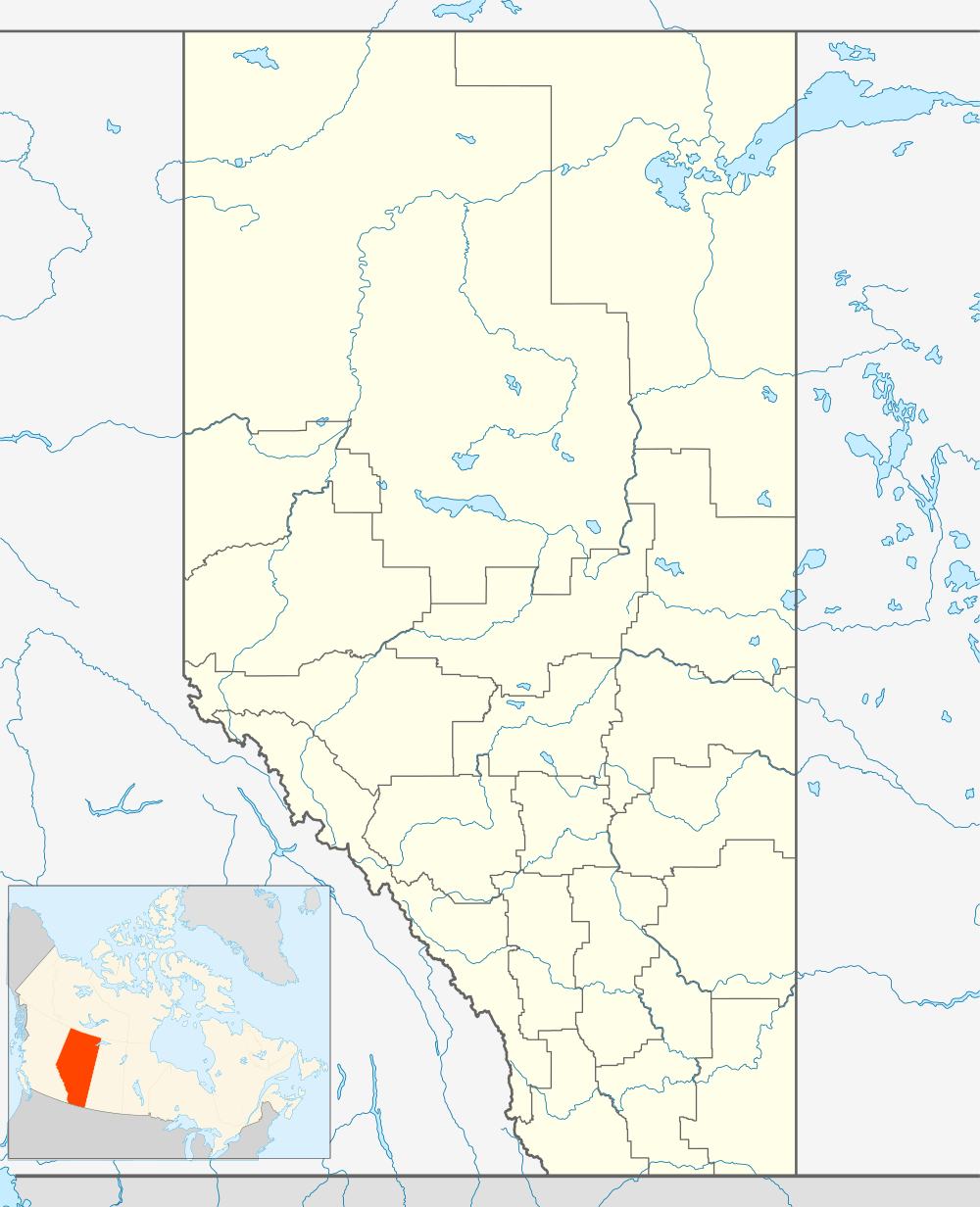Milo, Alberta
| Milo | |
|---|---|
| Village | |
| Village of Milo | |
|
Milo seen from the east | |
| Motto: Making Memories in Milo | |
 Milo | |
| Coordinates: 50°34′20″N 112°52′58″W / 50.57222°N 112.88278°WCoordinates: 50°34′20″N 112°52′58″W / 50.57222°N 112.88278°W | |
| Country |
|
| Province |
|
| Region | Southern Alberta |
| Census division | 5 |
| Municipal district | Vulcan County |
| Founded | 1909 |
| Incorporated[1] | |
| • Village | May 7, 1931 |
| Government[2] | |
| • Mayor | Robert Barry Monner (Deputy) |
| • Governing body | Milo Village Council |
| Area (2011)[3] | |
| • Total | 1.04 km2 (0.40 sq mi) |
| Elevation | 880 m (2,890 ft) |
| Population (2011)[3] | |
| • Total | 122 |
| • Density | 116.9/km2 (303/sq mi) |
| Time zone | MST (UTC-7) |
| Postal code span | T0L 1L0 |
| Area code(s) | 403 |
| Highways |
Highway 542 Highway 842 |
| Waterway | McGregor Lake |
| Website | Official website |
Milo is a village in Vulcan County, Alberta, Canada. It is located on Highway 542, approximately 127 kilometres (79 mi) southeast of the City of Calgary and 72 kilometres (45 mi) east of the Town of High River. Milo is mainly an agricultural service community.
Demographics
In the 2011 Census, the Village of Milo had a population of 122 living in 57 of its 64 total dwellings, a 22% change from its 2006 population of 100. With a land area of 1.04 km2 (0.40 sq mi), it had a population density of 117.3/km2 (303.8/sq mi) in 2011.[3]
The population of the Village of Milo according to its 2007 municipal census is 122.[4]
In the 2006 Census, Milo had a population of 100 living in 58 dwellings, a 13% decrease from 2001.[5] The village has a land area of 0.48 km2 (0.19 sq mi) and a population density of 208.3/km2 (539/sq mi), with an average age of 54.
Amenities
Amenities include a community hall, curling rink, walking paths, hotel, library, school, and skating arena. The village has a grocery, pub, and cafe. The community is home to a Lutheran church and has an active Lions Club which maintains an attractive playground and picnic area. Other services are available in nearby Vulcan (50 km). A campground with 85 sites is located in a small park beside nearby McGregor Lake reservoir. The lake, which is a major part of an irrigation system, is popular for fishing, swimming, windsurfing, boating and birdwatching.
History
In 1909, Milo was settled 3 kilometres northeast of its present location when Jens (Jim) and Alete Aasgard moved here from Osseo, WI and built their store and home. The town was named for Milo Munro, first postmaster - his post office was in the Aasgards' store. Nearby, a blacksmith shop and Bank of Hamilton opened. Before 1920, the Village of Milo had a telephone office, butcher, pool hall, community hall, and ice cream parlor.
A new railroad extension into the area did not reach the young community, so in 1924, Milo was moved to the side of the train tracks. Most of the buildings were pulled to the new location. The town hall was too large and was dismantled in sections and rebuilt at its new location. Village status was achieved in 1931. A new community hall was built in 1985 and the curling rink expanded and renovated in 1998. Since 2000, developments along the shores of McGregor Lake have attracted cottagers and vacationers from Calgary. The original site of the village - the Aasgards' farmstead and store - are now part of Canada's largest comb honey beekeeping farm, owned by Don and Ron Miksha.
See also
References
- ↑ "Location and History Profile: Village of Milo" (PDF). Alberta Municipal Affairs. October 21, 2016. p. 463. Retrieved October 23, 2016.
- ↑ "Municipal Officials Search". Alberta Municipal Affairs. November 18, 2016. Retrieved November 21, 2016.
- 1 2 3 "Population and dwelling counts, for Canada, provinces and territories, and census subdivisions (municipalities), 2011 and 2006 censuses (Alberta)". Statistics Canada. 2012-02-08. Retrieved 2012-02-08.
- ↑ Alberta Municipal Affairs (2009-09-15). "Alberta 2009 Official Population List" (PDF). Retrieved 2010-09-12.
- ↑ Statistics Canada. "Canada 2006 Census: Milo - Community Profile". Retrieved 2007-06-08.
External links
 |
Arrowwood | Queenstown | Majorville |  |
| High River | |
Brooks | ||
| ||||
| | ||||
| Vulcan | Lomond | Rainier |
